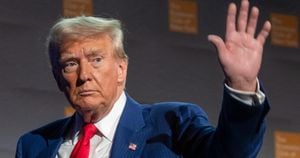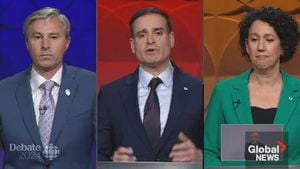Elon Musk's recent meeting with Iran's ambassador to the United Nations, Amir Saeid Iravani, has raised eyebrows across the political spectrum, igniting concerns over breaches of protocol and Trump's unconventional approach to foreign relations. The meeting, characterized by Iranian officials as "positive" and aimed at discussing methods to de-escalate tensions between the U.S. and Iran, took place at Iravani's residence just a day before Musk's appointment as the co-leader of Donald Trump’s newly-formed cost-cutting department.
The reported discussions diverge from traditional diplomatic routes, capturing attention at a time when the Biden administration has been recognized for its restraint toward Iran. The U.S. does not maintain formal diplomatic relations with Tehran, which means engagements like Musk's can signify alternative pathways for diplomacy outside established protocols. Not only does this raise questions about the legitimacy of Musk’s engagement, but national security experts have labeled it alarmingly haphazard, especially considering Trump’s history with the Islamic Republic.
During his original term, former President Trump had adopted a hardline stance against Iran, withdrawing from the 2015 nuclear agreement and instigated sanctions deemed as "maximum pressure," leading to significant economic hardships for the country. Critics of Musk's meeting have pointed to the Logan Act, which prohibits unauthorized private citizens from conducting foreign diplomacy, as warranting scrutiny—though no charges have ever been successfully prosecuted under this act historically.
Musk has increasingly found himself embroiled with global leaders. Sometime before the meeting with Iravani, he spoke on the phone with Ukrainian President Volodymyr Zelenskyy, reinforcing his stranglehold on negotiations with significant political impacts. It follows then, Musk's rising placement within Trump's inner sanctions as he attempts to cut through the bureaucratic stringency associated with American politics.
The U.S. political environment has polarized sharply around discussions of engaging Iran, particularly as Trump's cabinet includes known Iran hawks, such as Senator Marco Rubio, who historically advocated tough measures against Tehran. These appointments could lead to potential conflicts should informal talks escalate to more serious diplomatic engagements.
Reports suggest the meeting was not fully disclosed to Trump’s newly appointed national security team, establishing concerns about how upcoming engagements with Iran will be orchestrated, and who will be primarily involved. American diplomats typically oversee such interactions, yet this meeting hints at alternative frameworks for diplomacy, reminiscent of Trump’s earlier unorthodox tactics.
Musk's rising awash within Trump’s administrative orbit reflects broader sentiments of bypassing traditional state functions; there's growing commentary on how he could operate outside the established norms, recalling his prior collaboration with the former president during contentious negotiations with foreign leaders.
The tech entrepreneur’s involvement with Iranian officials may be seen as controversial, especially within GOP hawks vehemently opposing any perceived softening of U.S. policy. Trump’s administration could represent the first significant incursion of private citizens directly engaging longstanding adversaries, stretching beyond typical bipartisan political discourse. This model of negotiation could alter the dynamics of international relations, whereby non-political figures assume roles traditionally held by seasoned diplomats.
Experts remain divided on the ramifications of such meetings. Some argue this could enable more fluid dialogues leading to breakthroughs, whereas others fear the erosion of established diplomatic channels could exacerbate tensions, possibly undermining national interests.
With Musk at the forefront of this dialogue, the debates surrounding U.S.-Iran relations are likely to shift dramatically. The likelihood of less conventional negotiations appears imminent, potentially leading the way for what Trump’s team might brand as “creative diplomacy.” A line is being drawn between traditional power politics and the burgeoning influence of tech moguls within government spheres.
The crux of the situation leans firmly on Trump’s positioning concerning Iran's capabilities and ambitions. Historical attempts to fracture their influence through punitive measures are complicated by the stalled economy and internal dissent Iran currently faces. Musk’s perceived negotiation skills, propelled by his influence and unconventional contacts, could be viewed as both dangerous and innovative, placing significant authority within hands previously deemed outside the political sphere.
Despite the uncertainties, the path forward will depend broadly on electoral dynamics concerning the upcoming Trump administration, and how Musk balances his multifaceted role as both economic trailblazer and potential conduit for international dialogue. Navigated adeptly, such interventions could pave the way for unprecedented agreements or dialogue models; navigated poorly, they bear the risk of entrenching divisions and fresh conflicts.
The perspectives surrounding Musk's interaction with Iravani are likely to fuel both political discourse and public debate, as sentiments of concern and anticipation mount on the future of U.S.-Iran relations amid shifting diplomatic landscapes. Looking at the past actions of the Trump administration, it’s clear the road to diplomatic engagement may not follow standard practices—an unknown terrain under the influence of modern technocrats.
All eyes may remain fixed on how this newly defined communication style evolves from here, and whether it will contribute to enhanced dialogue or deepen fractures between nations historically rife with tension. A pivotal moment, no doubt, as the specter of innovation engulfs face-to-face diplomacy, challenging the status quo of how nations yield to pressures and seek resolution.



